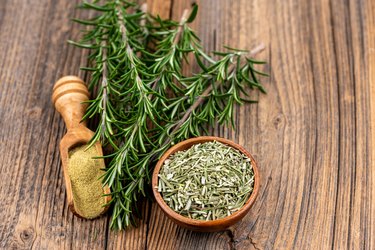
Spider mite control is a nuisance for many gardeners. When these pests move in, they can wreak havoc on plants, which can lead to total defoliation or decreased harvests if left untreated. When you first notice that your plant may be afflicted with spider mites, you can act fast and get rid of them with essential oils instead of using a chemical insecticide.
What Are Spider Mites?
Video of the Day
Spider mites are the most common garden pests. These tiny mites emerge during warm weather to feed on plant sap. Spider mites reproduce rapidly and have multiple generations within a growing season. As a result, infestations can quickly get out of hand if they are not identified early.
Video of the Day
Because spider mites are smaller than the head of a pin, look for signs of their presence instead, such as their trademark webbing on the underside of leaves and branches. Small white or yellow spots on leaves can also be a sign of spider mites. Because they eat the sap from leaf tissues, leaves can curl and brown when infested with spider mites. These leaves will eventually drop off as the plant grows weaker.
What Are Essential Oils?
Essential oils are potent concentrated plant extracts that are obtained through either pressing or distillation. They are utilized via aromatherapy, ingestion (only under the direction of a professional) and topical application.
However, because essential oils are so potent, they can cause skin irritation if not properly diluted for topical use.
Essential oils make effective, nontoxic spider mite control because the oils that they contain allow them to stick to leaves and not wash away, while their potent fragrance masks the plant's pheromones and inhibits insects' abilities to recognize the plants.
Making a Spider Mite Spray
You can make a simple, nontoxic spider mite spray that targets spider mites without harming the beneficial mites that are helping to curb your spider mite infestation.
Mix a solution of soap and water by combining 1 teaspoon of lemon-scented liquid dish soap with 1 quart of tap water in a jug. Be sure to avoid dish soaps with degreasing properties, bleach or antibacterial ingredients. Then, add a 1/2 ounce of rosemary essential oil to the mixture to help emulsify the solution. Be sure to shake well before every use.
Pour the solution into a spray bottle and spray your plants every morning or late afternoon for four days, while avoiding the warmest hours. Then switch to an every-other-day application for two weeks. Once the spider mites are under control, you can decrease your application to once a week to prevent future infestations.
Make a Preventative Essential Oil Spray
If you're looking for a more potent mixture, you can use three essential oils as spider mite control. These oils will prevent a variety of pests and are commonly associated with pest control.
You will need marigold oil, peppermint oil and rosemary oil. Marigold oil helps prevent aphids, whiteflies, flea beetles and nematodes. Peppermint oil prevents ants, spider mites and squash vine borer, while rosemary oil prevents cabbage moths and other mites.
Create the essential oil mixture by combining 1/2 ounces of each oil. Once combined, add about 1 teaspoon – or 20 drops – of the essential oil mixture to 1 gallon of water. Next, add 5 drops of dish soap and then mix. Spray your plants early in the morning and re-apply every two weeks as needed.